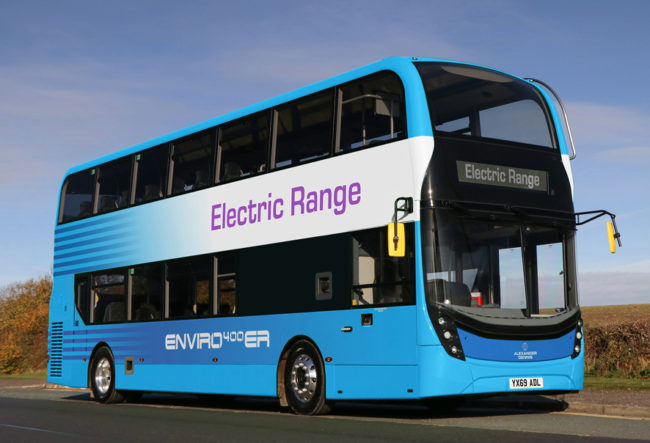Aims to contribute in sustaining air quality improvements in UK towns and cities

Alexander Dennis Ltd. (ADL), a subsidiary of NFI Group Inc., announced a vision for the transformation of buses in the United Kingdom. This includes service of at least 10,000 new low, ultra-low and zero emission buses, within the next 4 years. The first of them is expected to hit on the road before the end of the year. This move shall maintain the benefits of lower pollution and better air quality towns and cities have experienced during the coronavirus lockdown.
The coronavirus lockdown has shown the liveability of towns and cities free from the chokehold of traffic congestion dominated by cars, as traffic volumes have diminished while people stayed at home to protect the NHS and save lives. With over 60% of UK road transport emissions in normal times caused by cars – compared with under 3% caused by buses – the result has been a stark improvement in air quality.
Colin Robertson, Chief Executive of Britain’s largest bus builder, ADL, said: “There is strong public support for locking in these benefits through and beyond the post-coronavirus recovery to keep a healthier environment and continue the fight against climate change.”
He added: “Along with active travel and other modes of public transport, buses are a crucial part of the solution. As a society, we need to act immediately and deliver benefits as quickly as possible to minimise the deterioration of air quality when the economy restarts.”
Horses for courses
Brand new low and ultra-low emission buses could be ready before the end of the year to take older buses with ageing diesel engines off the streets or to offer additional capacity to facilitate social distancing. These ultra-low emission buses could bring self-charged zero emission electric range capability – completely cutting out emissions on high streets, near schools or at hospitals – without losing time to infrastructure planning and installation.
Colin Robertson explained: “We are supportive of all cutting edge clean bus technologies and recognise that one size does not fit all, which is why we have developed a choice of solutions which meet cities and operators’ individual requirements and priorities – whether that is air quality targets, carbon reduction, interior layouts, acquisition costs, total cost of ownership, or a blend of all of these. We have invested tens of millions in innovation – our solutions are road-ready to be delivered at scale with the reassurance that they will perform as required.”
Work could begin in parallel to plan and develop the infrastructure for zero emission buses, with battery electric buses available in volume supported by proven expertise in rolling out fleets. Hydrogen buses will play a role for routes requiring additional range and they will be ready when a fuelling infrastructure and a sustainable supply of green hydrogen have been put in place.
10,000 buses over four years would represent a return to the healthy levels of investment in a modern bus fleet which had been seen until the impact of previous governments’ cuts were felt in the last years. UK bus manufacturers including ADL have the production capacity to meet this demand. Further investment to speed up the de-carbonisation of transport could create additional highly skilled jobs in a world-class industry.
In tune with demand
Colin Robertson further informed: “The UK Government’s earlier £5bn pledge for buses and cycling recognises the need to invest in active and sustainable models of travel. This is now more imperative than ever as the economy emerges from the impact of coronavirus. We urge the UK Government and devolved administrations to speed up the transition to cleaner transport by accelerating the funding earmarked for zero emission buses and assuring health benefits from an immediate positive impact on air quality can be delivered by low and ultra-low emission buses that could be in service before the end of this year.”
Clean, spacious and well-equipped buses would also serve to reassure passengers of a safe journey – with social distancing as required – to places of work, high streets, shopping centres and leisure activities, helping the economic recovery of the nation.
As the UK’s largest bus manufacturer, ADL is ready to rapidly deliver the required low, ultra-low and zero emission buses. Employing 2,500 staff in the UK and supporting a further 12,500 jobs in the broader supply chain, ADL’s UK production capacity of over 1,500 buses per year could be increased to provide the benefits of cleaner buses on a wide scale. ADL offers the widest range of technology solutions on the market including low emission buses, ultra -low emission electric range hybrids and zero emission battery as well as hydrogen fuel cell buses.
Bus manufacturing represents more than 10% of the UK’s motor industry employment total and bus manufacturers meet more than three quarters of domestic demand, keeping investment in the country. UK bus manufacturing is globally recognised for its innovation in low and zero emission bus technologies, energy-efficient design and passenger amenities. A healthy home market is crucial to a vibrant UK bus manufacturing industry as it enables it to export its world-class products and grasp significant opportunities for Global Britain. “ADL has a proud history of working with the industry, not just for the industry but for the nation,” said ADL Chief Executive Colin Robertson.
“We have shared these proposals with senior ministers in the UK and Scottish Governments to show how our industry can lead post-coronavirus economic recovery to deliver health benefits for the entire country. The realisation of our proposals can begin immediately, and they could be scaled up in size and ambition to match councils’ and governments’ decarbonisation targets. We are ready to deliver for the nation,” concluded Robertson.